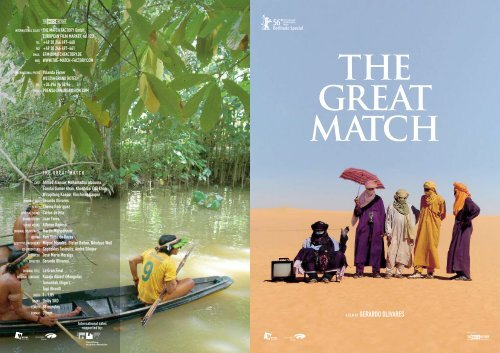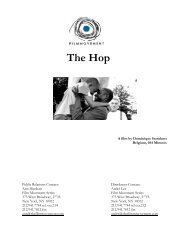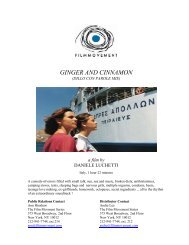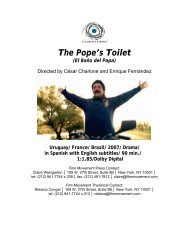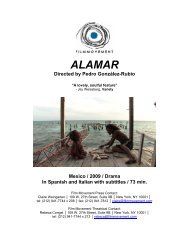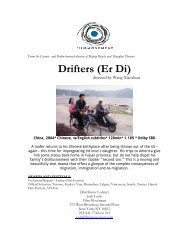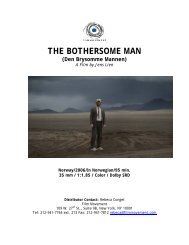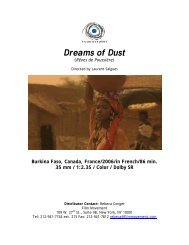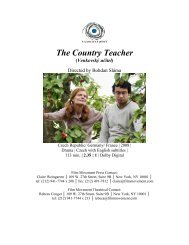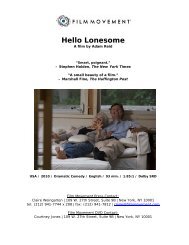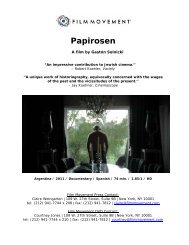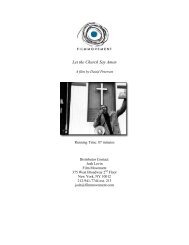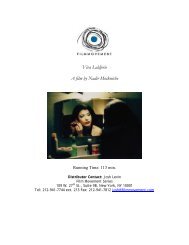The Great Match Press Kit - Film Movement
The Great Match Press Kit - Film Movement
The Great Match Press Kit - Film Movement
You also want an ePaper? Increase the reach of your titles
YUMPU automatically turns print PDFs into web optimized ePapers that Google loves.
INTERNATIONAL SALES THE MATCH FACTORY GmbH<br />
EUROPEAN FILM MARKET, no. 123<br />
TEL +49 30 246 497-460<br />
FAX +49 30 246 497-461<br />
EMAIL EFM@MATCHFACTORY.DE<br />
WEB WWW.THE-MATCH-FACTORY.COM<br />
INTERNATIONAL PRESS Yolanda Ferrer<br />
WESTIN GRAND HOTEL<br />
TEL +34 696 96 58 96<br />
EMAIL PRENSA@WANDAVISION.COM THE<br />
T H E G R E A T M A T C H<br />
CAST Ahmed Alansar, Mahamadou Alzouma,<br />
Esentai Samer Khan, Khoshibai Edil Khan,<br />
Wirapitang Kaapor, Kinchiran Kaapor<br />
ORIGINAL IDEA Gerardo Olivares<br />
SCRIPT Chema Rodríguez<br />
ORIGINAL SOUND Carlos de Hita<br />
SOUND EDITING Juan Ferro<br />
SOUND MIXING Alfonso Raposo<br />
ORIGINAL SOUNDTRACK Martín Meissonnier<br />
EDITING Rori Sainz de Rozas<br />
EXECUTIVE PRODUCERS Miguel Morales, Stefan Beiten, Nikolaus Weil<br />
CO-PRODUCERS Sophokles Tasioulis, André Sikojev<br />
PRODUCER José María Morales<br />
DIRECTOR Gerardo Olivares<br />
ORIGINAL TITLE La Gran Final<br />
ORIGINAL LANGUAGE Kazajo dialect (Mongolia)<br />
Tamashek (Niger)<br />
Tupí (Brasil)<br />
RATIO 1 : 1,85<br />
SOUND Dolby SRD<br />
LENGTH 88 minutes<br />
FORMAT 35mm<br />
International sales<br />
supported by:<br />
GREAT<br />
MATCH<br />
A FILM BY GERARDO OLIVARES<br />
World Sales
the great match<br />
How is it possible that children living in the most distant<br />
corners of the Mongolian steppes know who Ronaldo is?<br />
‘<strong>The</strong> <strong>Great</strong> <strong>Match</strong>’ is a comedy in three parallel stories about the<br />
trials and tribulations of a group of men who have two things<br />
in common: they live in remote regions of the planet, and they<br />
are determined to watch the final match of the Japan-Korea<br />
2002 World Cup between Germany and Brazil.<br />
A family of Mongolian nomads, a Tuareg camel caravan in the<br />
Sahara, and a group of Amazon Indians are our leading characters.<br />
All of them live hundreds of kilometres from the closest<br />
place where they can watch television, or they must face great<br />
difficulties getting there. However, these men have the ingenuity<br />
and willpower to achieve their goal.<br />
In a world in which access to information is seemingly simple<br />
and immediate, it is possible to live any world event in real time<br />
from a comfortable couch in our homes. However, what happens<br />
in the most isolated places on earth? Do people live their<br />
lives outside this information? Do they have access to it?<br />
It is not easy to have a television set, a power generator or<br />
a satellite dish available in these places. Nevertheless, these<br />
people are informed of everything going on in the world today,<br />
especially the feats of their sport heroes. How do they manage?<br />
In the most astonishing ways. This is what ‘<strong>The</strong> <strong>Great</strong> <strong>Match</strong>’<br />
attempts to unveil, the plight of a group of men isolated on<br />
the far edges of the planet, but determined to do everything to<br />
watch a football match.<br />
ALTAI MOUNTAINS (MONGOLIA)<br />
In the Altai mountains there is an ethnic group that<br />
hunts with golden eagles. <strong>The</strong> children learn to ride a<br />
horse first, and then they learn to walk.<br />
Talaikhan is 50 years old and worked for many years in a Russian<br />
coal mine. That is where he watched his first football match.<br />
Today his brother Kumarkan got cross with him. He told me that<br />
two foxes escaped when they were out hunting. Talaikhan hadn’t<br />
been paying attention. He was listening to the radio with his headphone.<br />
It was the Russian league fi nal.<br />
THE FILM’S ORIGINS<br />
It all began on a trip to Mongolia. It was November 2001 and I<br />
was looking for locations for a documentary. In the Altai mountain<br />
range I came across a line of travelling nomads. Th ere was<br />
an old television on the back of one of their horses. I asked them<br />
where they were going. “To the iron tree”, replied the one who<br />
looked like the chief. I wondered what was so special about a tree<br />
to attract a group of Mongols from across the steppe.<br />
“It isn’t a tree”, the chief told me, “it’s some pieces of iron that<br />
the soldiers left behind and they work like an antenna. It’s the<br />
cup fi nal.”<br />
<strong>The</strong> World Cup fi nal.<br />
Throughout my travels in Niger, Mongolia and the Amazon<br />
jungle, I have always found people who live completely cut off in<br />
the jungle or in the desert, or hunt with golden eagles... and who<br />
know which number Ronaldo wears on his back and how Zidane<br />
scored his latest great goal.<br />
That is how this film came about. In the film I want to show the<br />
adventures of these people who live in the most remote places<br />
on earth and share the passion for football. People who change<br />
their lives and are capable of covering many kilometres to watch<br />
a match.<br />
People who dream of watching <strong>The</strong> <strong>Great</strong> <strong>Match</strong>.<br />
Gerardo Olivares<br />
AMAZONAS (BRAZIL)<br />
Xama invited me to go hunting with him.<br />
While he was shooting monkeys with a<br />
blowpipe he told me of his latest argument<br />
with his wife.<br />
He was born in the heart of the Amazon,<br />
in the Sanema Indian community. He has<br />
always lived in the depths of the jungle.<br />
But one day the timber merchants arrived...<br />
And they taught him about football. And he<br />
loves it. But his family doesn’t understand it.<br />
I’ve seen them crossing the dunes in silence.<br />
<strong>The</strong>y’re the salt merchants.<br />
Hassan El Hadji, a noble Tuareg, leads the<br />
expedition. Today he told me that he has been<br />
crossing the desert the whole of his life, and that<br />
he worked as a translator for a German nongovernmental<br />
organisation for fi ve years.<br />
He asked after Oliver Kahn, the famous German<br />
goal keeper. He likes football. He discovered it<br />
through his German friends who gave him an<br />
old television. He’s had to convince some lorry<br />
drivers to lend him a battery, but he is still worried.<br />
Some twisted old bits of iron might work as<br />
an aerial, but how does the signal reach Teneré?<br />
TENERE DESERT<br />
(NÍGER)<br />
GERARDO OLIVARES<br />
Gerardo Olivares has been involved<br />
as director of wildlife, cultural and<br />
anthropology documentaries since<br />
1991, with the participation of<br />
Canal+ and TVE, and then sold<br />
internationally (Discovery Channel,<br />
National Geographic).<br />
His last documentary ‘Caravana’<br />
was produced by Pedro Almodovar’s<br />
El Deseo.<br />
WANDA FILMS<br />
WANDA FILMS, founded by José<br />
María Morales and Miguel Morales,<br />
was created in 1992 and is a company<br />
specialized in the production<br />
and distribution of European and<br />
Latin american independent cinema.<br />
WANDA has distributed more<br />
than 100 films, among them works<br />
by Krzysztof Kieslowski, Roman<br />
Polanski, Claude Chabrol, Wong<br />
Kar-Wai, Wolfgang Becker and produced<br />
more than 30 feature fi lms<br />
by directors such as Fernando Pérez<br />
(‘Suite Habana’, ‘ Madrigal’), Arturo<br />
Ripstein (‘Profundo Carmesi’, ‘Así<br />
es la vida’), Lucrecia Martel (‘La<br />
Cienaga’), Carlos Sorín (‘Historias<br />
Mínimas’, ‘Bombón – El Perro’),<br />
Costa Gavras (‘Le Couperet’),<br />
Daniel Burman (‘El abrazo partido’,<br />
‘Derecho de Familia’), Sigfrid<br />
Monleón (‘La Bicicleta’).<br />
GREENLIGHT MEDIA<br />
Greenlight Media AG, a leading<br />
German production and international<br />
distribution company,<br />
provides development, fi nance,<br />
production and distribution for<br />
international quality films. It is<br />
committed to delivering strong entertainment<br />
brands to audiences all<br />
around the world in both fi lm and<br />
non-film media. Founded in 1993,<br />
Greenlight Media took off with the<br />
launch of the wildly successful animated<br />
TV series ‘SimsalaGrimm’,<br />
which has since been distributed<br />
to over 120 territories worldwide,<br />
making it Germany’s number<br />
one exported TV series of all<br />
time. ‘Deep Blue’, Greenlight<br />
Media’s 2003 BBC Worldwide<br />
co- production Event Documentary,<br />
was the most successful German<br />
film abroad in 2004.


